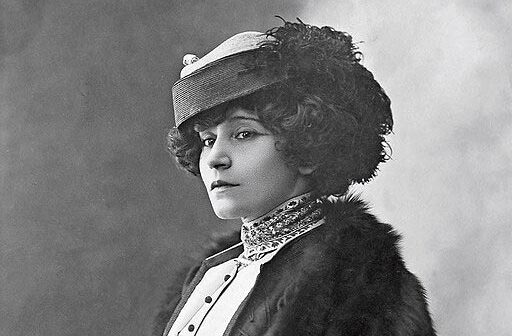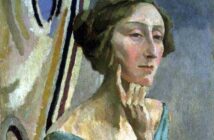This heartwarming essay by Tyler Scott is an homage to Colette (1873 – 1954), the bold and fearless French author, and discusses how she continues to inspire writers at any stage of practice:
In the fraught year of 2020, I had been too addled and worried to write very much. After a career as a freelancer, I started to wonder if things had ground to a halt. Was this the end of the line for me? After all that work? All that research? All those accolades? As Claudia Emerson, the late Pulitzer Prize-winning poet and onetime classmate told me, “Sometimes it’s just easier to quit.”
So, what opened my eyes, jolted my imagination, made me grab a pen and pick up my dusty journal? Colette. Thanks to a famous French author, I am writing again for the first time in months.
Slow Down and Study Life
How would a belletrist most people in the United States have never heard of help me heal? Because her prose is voluptuous, wistful, and sometimes saucy and when I read her, she reminds me to slow down, study, and take more pains with my writing. To paint with words layer by layer.
I may look out my dining room window and see a bed of green moss yet with her ghostly hand guiding me, I realize the moss is grayish, forlorn, and striped with sunlight. And look! The mayor next door is heading to work at the newspaper (I live in a small town where people wear several hats). And why is Mr. So-and-So walking his retriever so quickly this morning? Is it really that cold?
A writer like Colette encourages you to take the extra step and look for the art in the scenery as well as the people. Find the beauty in the simple and the simple in the beauty. Our world is a prism of detail.
Discovering Colette in Paris
Like many Southern girls way back when (I am a woman of a certain age), my parents sent me on Junior Year Abroad in 1977 to learn a language, broaden my horizons, and learn some Old-World etiquette. I chose Paris.
In my French program, I had a chic teacher named Pascal who one day assigned a passage from Colette as well as a pastiche. I had never heard of either and can’t remember what we read, but whatever it was, the floodgates opened. Colette has influenced me ever since. Her prose = poetry.
“Always up at dawn and sometimes before day, my mother attached particular importance to the cardinal points of the compass, as much for the good as for the harm they might bring. It is because of her and my deep-rooted love for her that first thing every morning, and while I am still snug in bed, I always ask: ‘Where is the wind coming from?’ only to be told in reply: ‘It’s a lovely day,’ or ‘The Palais-Royal’s full of sparrows,’ or ‘The weather’s vile’ or ‘seasonable.’ So nowadays I must rely on myself for the answer, by watching which way a cloud is moving, listening for ocean rumblings in the chimney.”
From Sido, Colette’s tribute to her mother
Becoming Colette
Sidonie Gabrielle Colette was born in 1873 in Saint-Sauveur-en-Puisaye in Burgundy. Daughter of a retired soldier and politician and a strong-willed mother, she was a typical mischievous girl turned loose with her friends and family in the countryside, all of which would play major roles in her writing.
Her style was distinct, discreet: remember: she was a product of La Belle Epoque. I recommend Judith Thurman’s biography, Secrets of the Flesh, a Life of Colette,for an excellent overview of this remarkable woman’s life.
Colette was prolific – she created about 80 works, including books, reportage, plays, short stories, essays, movie scripts, criticism, a libretto for Ravel – a veritable library. A feminist who often wrote autobiographically, Colette did not shy away from sexual themes, to borrow from Tolstoy, she wrote about “man’s most tormenting tragedy – the tragedy of the bedroom” – all with Mother Nature as a backdrop.
At twenty, she was swept off her feet by an older boulevardier from Paris, Henri Gauthier-Villars, Willy, who was also a publisher, editor and managed a stable of ghostwriters writing potboilers. During their early years together, Willy figured that Colette had entertaining schoolgirl tales, so he had her write them down, being sure to add some spice.
Thus, was born the Claudine series: Claudine at School; Claudine in Paris; Claudine Married; and Claudine and Annie,all bestsellers. The bad news was these books were published under Willy’s name, not to mention he also locked Colette in her room so she would toil away – after all he was making money off her talent and his editing. (“And that is how I became a writer,” she once recalled.) In 1904 she published Dialogue des Bêtes under her husband’s pen name Colette Willy.
Two years later, miserable, fed up with his philandering, she finally divorced Willy and struck out on her own, publishing La Retraite Sentimentale under her surname. The following years gave her plenty of material: a career in musical theater; affairs with both sexes; another marriage to the editor in chief of the newspaper Le Matin; an affair with her stepson (!); two world wars; motherhood late in life; opening two beauty shops; receiving the Legion of Honor and Prix de Goncourt; and enduring the Nazis in Occupied Paris with her Jewish third husband who was interred for a period.
Colette wrote her novel, Gigi, in 1944 and later chose an unknown actress named Audrey Hepburn to star in the Broadway adaption in 1951.
The Vagabond, Cheri, The Last of Cheri, The Tender Shoot and Other Stories are some of my favorite tomes as well as editor and translator Robert Phelps’s Earthly Paradise, where he pieced together parts of her prose to tell her autobiography. This was the first book I bought of Colette’s and my copy is so well-worn that the dust jacket is in four pieces and I use them as bookmarks. I don’t think there is such thing as a bad book by Colette. She was masterful and if the truth be known, her writing is so smooth and heady she is one of the few writers I can read before I go to sleep. The style is a true lull of words, a song.
Colette Gives Writers a Sense of Hope
“To write, to be able to write, what does that mean? It means spending long hours dreaming before a white page, scribbling unconsciously, letting your pen play round a blot of ink and nibble at a half-formed word, scratching it, making it bristle with darts and adorning it with antennae and paws until it loses all resemblance to a legible word and turns into a fantastic insect or a fluttering creature, half butterfly, half fairy.”
From The Vagabond, a story of a young woman who is torn between love, independence, and art
A writer like Colette gives us a sense of hope and pride and after such a tough and sad year as 2020 was, I think all of us need rejuvenation. Moreover, I understand why, long ago, my teacher assigned the reading and pastiche; Colette’s style is descriptive and easy to imitate and I think writing bad Colette is better than not writing at all.
Nowadays, I read her in English and the translations are excellent. Given she was penning a century ago, she had a rich vocabulary, so I usually keep a list of words I don’t know. Words like superannuated, Ortolan, and melopoeia are building blocks and I’ve always had the rule that each time I write an article, I must use a new word.
Colette’s Advice to Writers
How does else does Colette influence me? She wrote until her last days, even though she was bedridden and crippled with arthritis and she never let poverty, heartbreak, war, an abusive husband, celebrity, motherhood, or bad health get in the way of her trade. This reminds me not to turn into a wannabe who talks about writing more than she writes.
She had many key words of advice:
- “Writing only leads to more writing.”
- “Look long and hard at the things that please you, even longer and harder at what causes you pain.”
- “Sit down and put down everything that comes into your head and then you’re a writer. But an author is one who can judge one’s own stuff’s worth, without pity, and destroy most of it.”
- “Nobody asked you to be happy. Work. Do you hear me complaining?”
And my favorite:
- “Hope costs nothing.”
Next time you hit a wall in your writing, choose a book from one of your favorite authors. Peruse, take notes, read and revel: remember these writers suffered most of the same challenges you and I have. Dry spells, penury, distractions, too many responsibilities, family and friends who rolled their eyes and patted us on our shoulders, enough rejection to paper a bedroom wall. Turning to a favorite wordsmith for guidance is a lot cheaper than therapy.
The Death of a Legend, and a Legacy
On August 3, 1954, Colette, after a sip of champagne, died at her apartment in Palais Royale. She was, as ever, surrounded by her beloved cats. The onetime schoolgirl from Burgundy had become a beloved national treasure with the same stature as Proust and considered a female Montaigne.
Because of her two divorces, the Catholic Church denied her a Christian burial, but France had other ideas. She was given a state funeral with full honors, the first for a woman, and buried with much pomp and respect. A kind soul mounted this plaque on a wall in her garden: Ici vecut, ici mourut Colette, dont l’oeuvre est est une fenetre grande ouverte sur la vie. (Here lived, here died Colette, whose work is a window wide-open on life.)
Many years ago, my husband and I owned a sailboat, a 29-foot sloop, sails trimmed in navy blue, teak interior, dingy dragging along behind. When I close my eyes, I see the boat cutting through the choppy waves of the Chesapeake Bay and I hear the sounds of happiness from family and friends, all under a beamy sun and watchful seagulls. We were surrounded by nature and joy, memories we all hold so dear now.
The name of the sailboat was Colette.
Image attribution: Henri Manuel, Public domain, via Wikimedia Commons
You can also read the full article by Tyler on the Literary Ladies Guide page.



